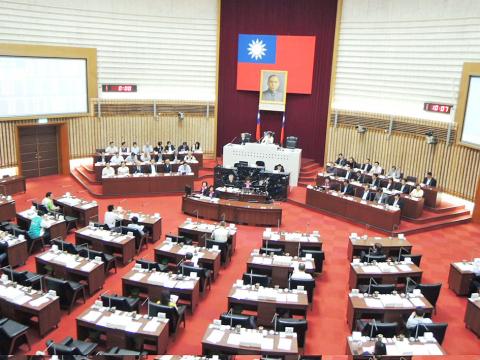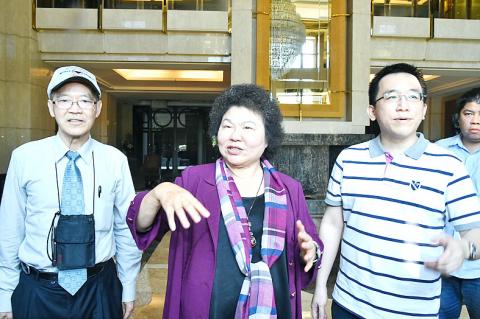The Presidential Office has rejected a renewed call from local governments to pardon former president Chen Shui-bian (陳水扁), saying there are still ongoing criminal cases involving Chen.
“Presidential pardon is an issue that will only be considered after a final verdict has been reached. However, a number of criminal cases against Chen are still going on,” the Presidential Office said in a statement released yesterday.
The office issued the statement shortly after the Kaohsiung City Council passed a motion proposed by the council’s Democratic Progressive Party (DPP) caucus urging President Ma Ying-jeou (馬英九) to grant a pardon to Chen before his term ends on May 20, which it said could facilitate rapprochement between the pan-blue and pan-green camps.

Photo Wang Jung-hsiang, Taipei Times
The motion was signed by 39 city councilors, four of whom are not members of the DPP.
Kaohsiung City Council Speaker Kang Yu-cheng (康裕成) of the DPP said the motion is a catalyst for “blue-green reconciliation.”
The Tainan City Council passed a similar motion proposed by two independent and two DPP city councilors on Wednesday last week, which garnered the support of 34 of the 56 participating city councilors.

Photo: Chang Chung-i, Taipei Times
On Monday last week, the Foundation of Medical Professionals Alliance in Taiwan also called for a presidential pardon for Chen, saying that the former president’s illnesses, including sleep apnea, suspected Parkinson’s disease and osteoporosis, could put his life at risk.
Speaking on the sidelines of a Kaohsiung City Council meeting yesterday, Kaohsiung Mayor Chen Chu (陳菊), a DPP member, said she approved of the motion, calling on Ma to make an effort to assuage Taiwan’s political confrontations and break through the blue-green divide.
“I believe the motion submitted by the DPP caucus urging Ma to pardon Chen Shui-bian can help achieve social harmony... Ma’s willingness to handle the matter as a president will be extremely conducive to Taiwan’s development,” Chen Chu said.
Later yesterday, Chen Chu and former minister of health Lee Ming-liang (李明亮) accompanied vice president-elect Chen Chien-jen (陳建仁) on a visit to Chen Shui-bian in Kaohsiung, where the former president is living.
Chen Shui-bian, who was in office from 2000 to 2008, has served more than six years of a 20-year prison term for several convictions on corruption charges.
Medical parole granted to the former president has been extended five times since he was first granted compassionate release in January last year. The former president’s health is re-evaluated every three months, with his sixth parole set to expire on May 4.
Meanwhile, Chen Shui-bian’s son, Chen Chih-chung (陳致中), yesterday posted a message on Facebook, thanking the public, the medical alliance and the Tainan and Kaohsiung city councils for showing concern for his father’s health.
“Restoring my father’s health, reputation and freedom is always on the minds of my grandmother and my other relatives,” Chen Chih-chung said.
Additional reporting by Tsai Wen-chu and CNA.

SECURITY: As China is ‘reshaping’ Hong Kong’s population, Taiwan must raise the eligibility threshold for applications from Hong Kongers, Chiu Chui-cheng said When Hong Kong and Macau citizens apply for residency in Taiwan, it would be under a new category that includes a “national security observation period,” Mainland Affairs Council (MAC) Minister Chiu Chui-cheng (邱垂正) said yesterday. President William Lai (賴清德) on March 13 announced 17 strategies to counter China’s aggression toward Taiwan, including incorporating national security considerations into the review process for residency applications from Hong Kong and Macau citizens. The situation in Hong Kong is constantly changing, Chiu said to media yesterday on the sidelines of the Taipei Technology Run hosted by the Taipei Neihu Technology Park Development Association. With

CARROT AND STICK: While unrelenting in its military threats, China attracted nearly 40,000 Taiwanese to over 400 business events last year Nearly 40,000 Taiwanese last year joined industry events in China, such as conferences and trade fairs, supported by the Chinese government, a study showed yesterday, as Beijing ramps up a charm offensive toward Taipei alongside military pressure. China has long taken a carrot-and-stick approach to Taiwan, threatening it with the prospect of military action while reaching out to those it believes are amenable to Beijing’s point of view. Taiwanese security officials are wary of what they see as Beijing’s influence campaigns to sway public opinion after Taipei and Beijing gradually resumed travel links halted by the COVID-19 pandemic, but the scale of

A US Marine Corps regiment equipped with Naval Strike Missiles (NSM) is set to participate in the upcoming Balikatan 25 exercise in the Luzon Strait, marking the system’s first-ever deployment in the Philippines. US and Philippine officials have separately confirmed that the Navy Marine Expeditionary Ship Interdiction System (NMESIS) — the mobile launch platform for the Naval Strike Missile — would take part in the joint exercise. The missiles are being deployed to “a strategic first island chain chokepoint” in the waters between Taiwan proper and the Philippines, US-based Naval News reported. “The Luzon Strait and Bashi Channel represent a critical access

Pope Francis is be laid to rest on Saturday after lying in state for three days in St Peter’s Basilica, where the faithful are expected to flock to pay their respects to history’s first Latin American pontiff. The cardinals met yesterday in the Vatican’s synod hall to chart the next steps before a conclave begins to choose Francis’ successor, as condolences poured in from around the world. According to current norms, the conclave must begin between May 5 and 10. The cardinals set the funeral for Saturday at 10am in St Peter’s Square, to be celebrated by the dean of the College